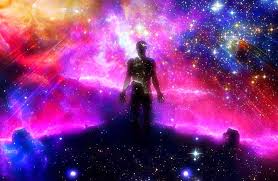…Its origins, and its amazing variety of forms, both “living” and “nonliving.” Our own limitations may have something to do with our attitudes. Be careful about believing science or religion when either one tells us it can explain our world, for each of those disciplines ignores too much. No matter what the source of this camouflage reality may be, our conscious lack of knowledge and understanding as we manipulate within it, through naive realism or any other system of belief or perception, ought to make us humble indeed; all arrogance should be transcended as we become more and more aware of the limitless beauty, complexity, and mystery that surrounds us, and of which we are a part. I don’t think it all came through chance. The mind can ask too many questions to be satisfied with mechanistic explanations, and nurturing that characteristic of dissatisfaction alone may be one of the most valuable contributions.
To me, even “ordinary” linear knowledge as it accumulates through the next century or two, not to mention over longer spans of time, is certain to severely modify or make obsolete many concepts about origins and evolution that today are dispensed by those in authority–and which most people accept unthinkingly.
For some years now, organized religion as a whole has been suffering from loss of faith and members, stripped of its mysteries by science, which, with the best of intentions, offer in religion’s place a secular humanism–the belief that one doesn’t need blind faith in a god in order to be morally concerned for the common welfare; paradoxically, however, this concern is most of the time expressed in religious terms, or with religious feeling. Yet science too has experienced many failures in theory and technology, and knows a new humility; at least partly because of these failures, anti-intellectualism has grown noticeably in recent years. How technology and religion have found a way to coexist, helping each other and others to grow and develop. Science frequently tries to explain the gaps that religion has been unable to explain, and religion has done so in kind of science. This tandem has maintained both parts of the spectrum from the smallest atom to the biggest technology companies.
I certainly am not turned on to realize that a major religion, for instance, teaches the “facts” of man’s basically corrupt and sinful nature; surely a religion in the best sense can offer beliefs superior to those! At the same time, I take note of the latest efforts of biological researchers to explain how, millions of years ago, a primitive DNA molecule could begin to manufacture the protein upon which life “rides,” and thus get around the contradiction: What made the protein that sustains the processes of life, before that life was present to make the protein? The scientist involved hope the new hypothesis will survive further tests and become “fact,” thus giving clues to the riddles of origins and evolution. How does one deal with new facts that undermine old facts, in whatever field of endeavor? Do we say that reality has changed? Upon examination, facts give.



